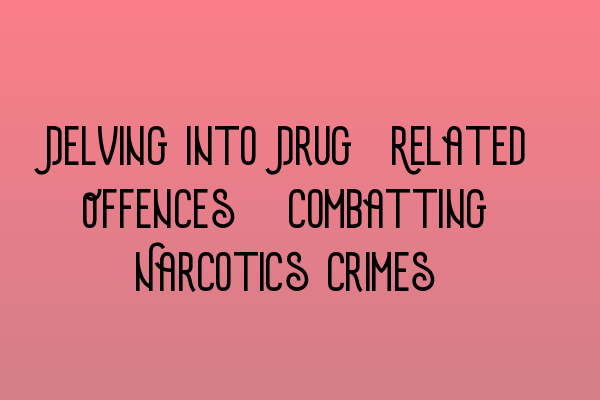Delving into Drug-Related Offences: Combatting Narcotics Crimes
Drug-related offences are a pressing concern in today’s society, with the illegal drug trade posing significant threats to public health and safety. As a criminal law practitioner, it is essential to understand the intricacies of tackling narcotics crimes and the legal implications involved.
Understanding Drug Laws and Regulations
Drug offences encompass a wide range of illegal activities, including possession, distribution, manufacturing, and trafficking of controlled substances. The laws and regulations governing drug-related offences can vary across jurisdictions, necessitating profound knowledge of local legislation.
When defending or prosecuting drug-related cases, it is crucial to be well-versed in the applicable legislation and its interpretation. Familiarity with case precedents and legal arguments related to drug offences can significantly impact the outcome of a case.
Investigation and Evidence Collection
An effective defense strategy or prosecution relies heavily on strong evidence collection and meticulous investigation techniques. Police investigators need to adhere to strict protocols during the search, seizure, and arrest processes to ensure the admissibility of evidence.
For defense lawyers, reviewing the evidence is crucial for identifying any constitutional violations or inconsistencies that may lead to a successful defense. Knowledge of forensic science and drug analysis techniques is essential in assessing the accuracy and reliability of evidence.
The Role of Rehabilitation and Treatment Programs
Addressing drug-related offences requires a multi-faceted approach that goes beyond prosecution. The integration of rehabilitation and treatment programs is vital in helping individuals overcome addiction and preventing relapses.
Understanding the existing rehabilitation programs and their effectiveness can be instrumental in negotiating alternative sentencing options for defendants. By advocating for rehabilitative measures, criminal law practitioners can contribute to reducing recidivism rates and supporting the rehabilitation of offenders.
Staying Updated with Legal Developments
To excel in the field of criminal law, practitioners must stay abreast of the latest legal developments and changes in drug-related legislation. The legal landscape is constantly evolving, and being knowledgeable about recent court decisions and legislative amendments is crucial to providing effective legal representation.
Continuing professional development, such as participating in SQE 1 Practice Exam Questions and SQE 1 Practice Mocks FLK1 FLK2, can help practitioners stay updated and enhance their understanding of drug-related offences. Additionally, enrolling in SQE 2 Preparation Courses and SQE 1 Preparation Courses can provide valuable insights and guidance specific to criminal law practice.
Conclusion
Combatting drug-related offences requires expertise, dedication, and a thorough understanding of the legal frameworks surrounding narcotics crimes. As a criminal law practitioner, it is essential to continuously enhance your knowledge and skills in this area to navigate the complexities of drug-related cases successfully.
For more information on SQE exams and upcoming SRA SQE Exam Dates, visit our related articles:
- SQE 1 Practice Exam Questions
- SQE 1 Practice Mocks FLK1 FLK2
- SQE 2 Preparation Courses
- SQE 1 Preparation Courses
- SRA SQE Exam Dates
